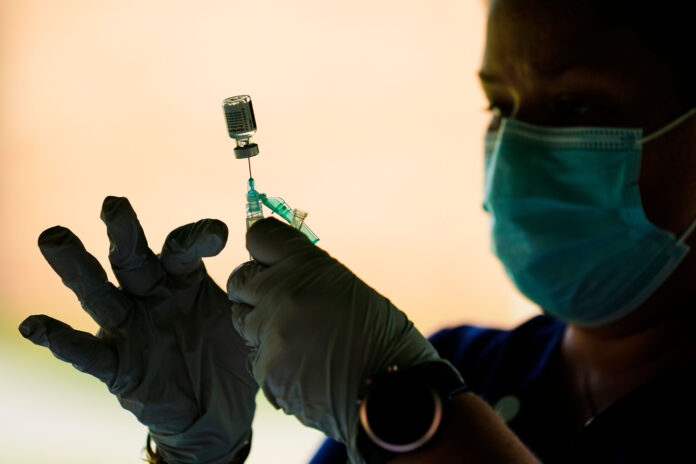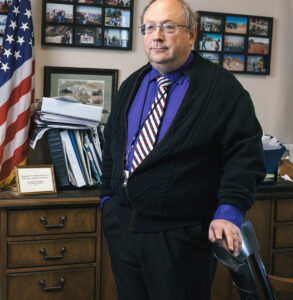
PROVIDENCE – Rhode Island’s top public health official on Wednesday said the nation will likely never reach herd immunity from COVID-19, but it’s time to move forward with life treating the virus as endemic while no longer in a state of emergency.
Speaking during the Providence Business News Spring 2022 Health Care Summit at the Providence Marriott Downtown, R.I. Department of Health Interim Director Dr. James McDonald said Rhode Island quietly dropped its state of emergency status for COVID-19 variants as of April 1. That emergency declaration was issued in August. The original statewide emergency declaration declared by former Gov. Gina M. Raimondo in March 2020 remains in effect until at least April 13, according to the governor’s office.
“The state of emergency expired March 31. But there was no announcement April 1 for a lot of reasons, saying, ‘Hey we’re in the endemic state,’” McDonald said. “That’s because, one, you don’t do that on April Fools’ Day. Two, it’s like, I’m not sure it’s anything to celebrate.”
But despite dropping the emergency status, McDonald said COVID-19 will always be a lingering problem in the U.S., due to holdouts who refuse to take the vaccine for a variety of reasons, including distrust in government.
“You’re going to be living with this for quite the foreseeable future,” McDonald said. “It would be nice [to reach herd immunity]. … I just don’t think it’s achievable in this country because … we aren’t willing to adopt that as a concept. In other countries it might happen. What’s ironic about it is in our country we have the best vaccines, but we have the most ambivalence about getting the vaccine. In other countries, they have more commitment to getting the vaccine, but they have cruddier vaccines. It’s just the weirdness of America.”
Are we even close?

“I don’t think it’s foreseeable in the future or anytime soon because I don’t think our culture is going to change that quickly,” McDonald said. “I think when I’m saying it’s an endemic disease, [that means] get used to it. You’re going to live with this for years. Because we’re just not as committed.”
Part of the resistance to vaccines is related to objections to “systemic racism” and a lack of trust, McDonald said. He described a story involving popup vaccination clinics, and someone pushing back against the effort as self-serving.
“ ‘You came [to the community with a clinic] because it helped you,’ ” said McDonald, recounting the story from a guest on his podcast who complained the real purpose of the clinic was to keep the residents from getting people who live outside the neighborhood sick. “But where are you with fresh fruits and vegetables? Where are you with primary care? Where are you with the stuff we really need?’ And she was right. And that’s a good example of what systemic racism looks like. It’s so polite.”
It’s a trust problem that can’t be changed quickly enough to reach herd immunity, McDonald said.
“We’re not going to fix systemic racism, health disparities and all these other problems, and are going to make everyone say, ‘I now trust this guy from the government telling me to get the vaccine,’ ” McDonald said. “That just doesn’t fix overnight. And two years is overnight in public health.”
Another panelist at the summit, Dr. Matt Collins, a family physician who is currently the chief medical officer and executive vice president at Blue Cross & Blue Shield of Rhode Island, warned that the state can’t treat COVID-19 like it’s in the “rear view mirror.” While the state is using new risk-assessment standards that look at hospital capacity instead of purely looking at transmission numbers, based on guidance from the Centers for Disease Control and Prevention, Collins said Rhode Island and its businesses need to be ready to reestablish masking and distancing requirements based on the level of virus spreading in the community.
“I think a lot of employers have been thinking about, ‘OK, we can just go back to work now. It’s business as usual.’ Collins said. “It’s not going to be business as usual. … [COVID-19 is] all around us. It’s on the horizon. It’s in the passenger side window and driver side window. … “When that transmission rate is going up, and those hospitalizations are going up … we need to reinstall those same measures that were really successful in a lot of places.”
Collins said “the new normal” means being ready to shift back to pandemic restrictions and working from home when possible.
“Many businesses, not all, have been able to shift to remote,” Collins said. “For those that have to show up – Blue Cross employees have to show up in retail sites and other customer facing positions – they’ve got to be protected. We’ve got to be able to do the masking and the distancing on a moment’s notice, frankly. I don‘t think this is ever going to be in the rear view mirror. This is the age of coronavirus.”
(SUBS second paragraph to CORRECT COVID-19 emergency declaration status.)
Marc Larocque is a PBN staff writer. Contact him at Larocque@PBN.com. You may also follow him on Twitter @LaRockPBN.












